Dealing with bloating on a vegan diet? You’re not alone! Find common causes, non-gassy foods, tips for prevention & more in this article.
Changing your diet can be difficult enough if you’re dealing with a lifelong habit.
But what if you experience additional bloating after going vegan? Rest assured, even decade-long plant munchers feel bloated and gassy from time to time.
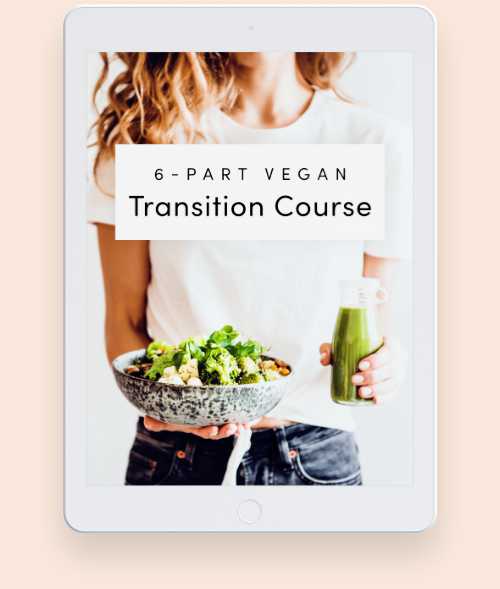
join our free vegan course!
Learn how to thrive on a plant-based diet with practical tips & a 3-day meal plan!
Find out what the most common causes of gas and bloating are, what your personal food culprit could be and how to ease into plant-based eating more gently!
Read about other vegan side effects, different vegan diets and food combining tips on our website and grab our free anti-bloat bundle at the end of this article.
What is bloating?
Abdominal bloating means that the gastrointestinal tract is filled with air or gas, causing the abdomen to be distended, hard and painful.
It can be accompanied by flatulence, burping, gurgling and pain.
Bloating is a common condition caused by a wide range of factors from diet to lifestyle and other health issues.
It’s completely normal to feel distention from food, fluids and gasses that are naturally produced by our gut bacteria! However, at some point, feeling gassy and bloated can become problematic.
Signs of concern
Please consult your doctor if you have any of the following symptoms:
- Prolonged abdominal pain
- Diarrhea or vomiting
- Fever or heartburn
- Changes in bloating or distention (getting worse)
- Bloating impacting your life negatively
If you only experience mild bloating that doesn’t bother you too much, keep reading for tips on how to prevent or get rid of excess gas!
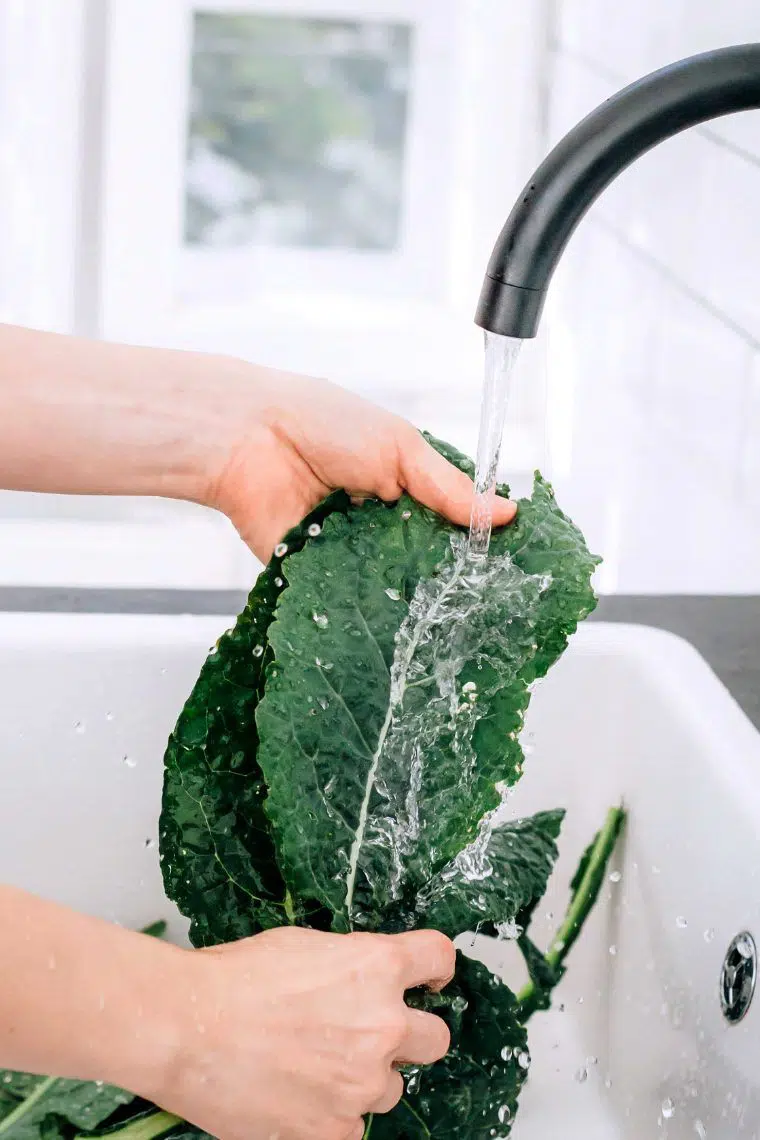
Reasons for bloating
Bloating can be caused by a huge range of lifestyle or medical factors! Here are the most common ones.
Gas
When we eat or drink, we always swallow some amount of gas. Even more so when we don’t take our time and eat very quickly — or when we drink carbonated drinks.
Chewing gum and smoking are two other habits during which excess gas is swallowed.
The only way this air can leave the body is by burping or flatulence.
Diet
If you eat too much food in one sitting or very irregularly, this can result in bloating.
Foods you — or your gut bacteria — are not used to eating can also cause some rumbling in the abdomen. Should you have an overgrowth or deficiency of bacteria within the GI tract, you’ll probably also experience bloating!
High-fiber foods physically take up more space in your intestines, and their digestion by gut bacteria creates extra gas! This is normal, though — eating fiber is important, and we’ll share some tips with you for digesting it better in just a bit.
If you have undetected intolerances or allergies, specific foods can also make you gassy even though they wouldn’t result in bloating for other people!
Top Allergy-Friendly Recipes →Medical
From celiac disease to chronic constipation, hormonal fluctuations, irritable bowel syndrome, Crohn’s disease and inflammatory bowel disease, there are many medical reasons why you might feel bloated!
They can be quite serious, so please seek out professional help if you suspect your bloating could be problematic.
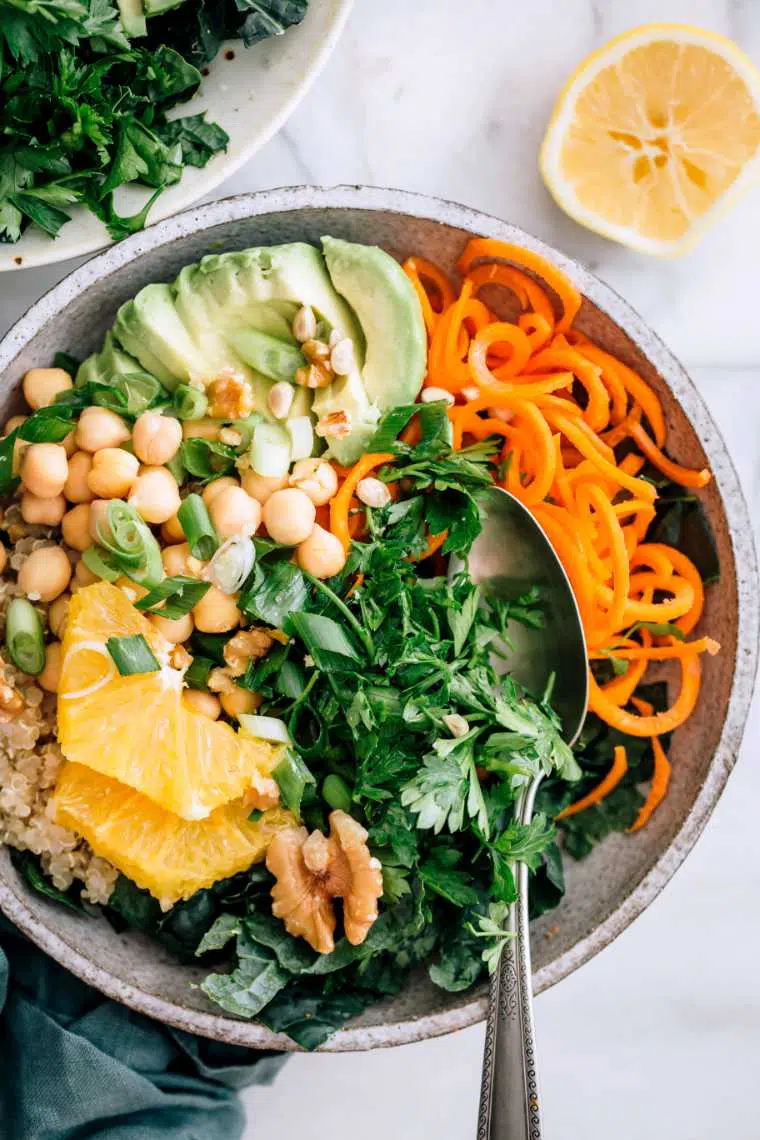
Does going vegan make you gassy?
Going vegan per se doesn’t make you gassy! As you can see above, not many of the reasons for being bloated come down to following a vegan diet.
If you replace non-vegan items with very similar vegan ones (i.e. swapping ground beef for vegan ground), you won’t experience much excess bloating!
But if you come from a diet based on processed foods and suddenly switch to a whole food plant-based diet, this can cause issues.
Such dietary changes can certainly lead to changes in digestion, so there might be an adjustment period.
If you feel bloated on a vegan diet, it’s most likely either a sudden increase in fiber or gas-producing foods like beans and cruciferous veggies!
How to prevent bloating
Eat slowly and mindfully
Mindful eating can help you to prevent overeating or binging. It also causes you to slow down and relax! Being too stressed can trigger further bloating.
By the way, don’t drink large smoothies too quickly, either!
Chew well
Keep your mouth closed while chewing and don’t swallow any food that’s still intact!
This helps break down the cell walls of plant-based foods and your saliva can start with the digestion process.
Drink enough water
Water plays an important role in digestion as it helps fiber to move through the body! If you don’t drink enough, any food you eat can stay in your GI tract for too long.

Don’t use straws
Drinking through straws causes excess air to be swallowed. The same is true for chewing gum! Trapped air can cause belching and feeling discomfort.
Eat regularly
We can get bloated if we’re too hungry and eat large amounts of food in one sitting because we feel starved!
It’s also better to spread fiber consumption throughout the day and aim for 1-2 servings of higher-fiber foods per meal.
Increase fiber-rich foods slowly
Track your food intake to find out how much fiber you’ve been used to eating each day. Don’t increase this amount too quickly!
Aim for at least 30 grams per day — it’s not uncommon for those on a vegan diet to eat up to 50-60 grams of fiber per day.
Watch certain foods
Eating lots of processed, salty, sugary, spicy or fatty foods has been shown to increase bloating. Keep these to a minimum!
Cook your veggies
Raw vegetables are harder to digest than cooked vegetables! Reduce the amount of raw salads or veggie sticks you eat and go for roasted or steamed vegetables instead.
Bonus points if you puree them into soup!
Keep a food journal
We’re all different, so perhaps there are some very “innocent” foods that cause excessive gas in your case!
The best way to detect them is to track your food intake for a while along with any symptoms of indigestion.
Once you see a common theme in your journal (this can be a specific food, time of day or even place where you eat if you feel stressed), you can take measures to limit anything that triggers bloating.
Check for food intolerances
FODMAPs, gluten, dairy, soy, yeast, fish, fructose and histamines are among the most common food intolerances.
If you suspect that you could suffer from one of them, get a proper test done and ask your doctor for further advice!
Vegan foods that don’t cause gas
- Fruit: berries, cantaloupe, grapes, pineapple, kiwi, clementine
- Veggies: avocado, bell peppers, zucchini, tomato, lettuce, spinach, green beans, bok chow
- Protein: Tofu, non-dairy yogurts, mock meats, nut butter
- Grains: White pasta or bread (choose gluten-free if needed), quinoa, rice, oats
Free Download
Learn more about anti-bloat foods, easy recipes and get a free food journal! Click here to download the PDF for free.
How to get rid of bloating
Drink peppermint tea
A cup of tea can be very relaxing, and the oil in peppermint leaves can help relax the gut and soothe digestive issues! Try if it works for you.
Move regularly
Taking walks or exercising regularly can help prevent or even deal with acute bloating! Trapped gas can be released more easily and physical activity supports your digestive system.
If flatulence is a concern, do some solo exercise outside!
Massage your stomach
You can help trapped air and gas to be released by massaging your stomach from right to left! Stop if you feel pain and seek medical help.
Consider supplements
Supplements like Beano can certainly help but should be taken wisely. If there is something fundamentally wrong with your GI tract, you need to fix the root cause!
Other routes are taking digestive enzymes, hydrochloric acid or vegan probiotics — depending on the cause of your bloating, these can either help or worsen the situation.
Please consider seeing a Registered Dietitian if the problem persists instead of throwing supplements at the problem for weeks and months!
FAQs
How long does bloating last when going vegan?
If you experience an average level of bloating on a vegan diet, you can cut back on fiber, whole beans or cauliflower and broccoli for a while.
Increase the portion size of these foods slowly or eat them in pureed form until your gut bacteria is used to them!
It’s normal to experience some amount of gas and bloating, no matter if you’re vegan or not. If you think that bloating becomes a problem for you, please seek out medical help!
Unfortunately, everyone is different, so there is no one-size-fits-all answer to this question.
How to prevent gas from cauliflower?
Broccoli and cauliflower are two popular veggies from the cruciferous family. They are versatile and healthy but they contain something called raffinose — a type of carbohydrate that gets fermented by our gut bacteria.
Along with the sulfur in those veggies, this can result in smelly gas!
If you get used to eating cauliflower bit by bit, you won’t have to deal with bloating and gas from it.
Steps towards a better tolerance of cruciferous vegetables include: cooking them, chewing them well, pureeing them and eating them with herbs and spices that aid digestion.
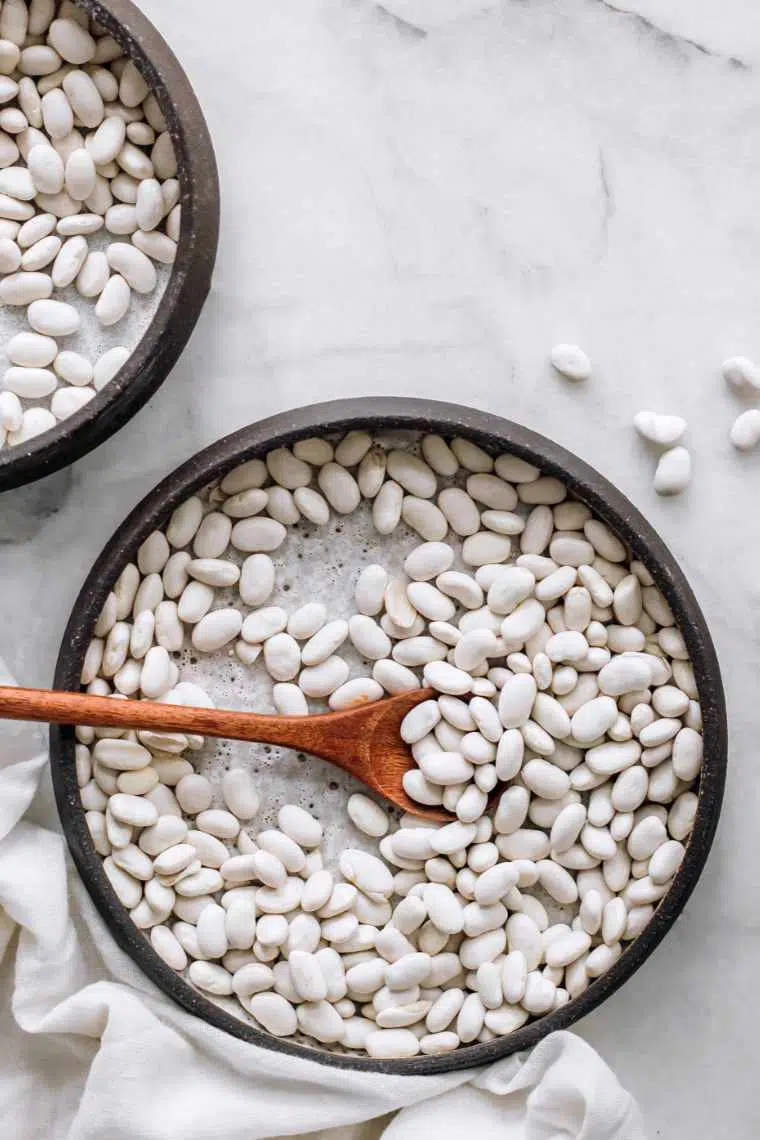
How to prevent gas from beans?
Try lentils first! They are usually easier on your digestion. Ease your way into eating more beans and other legumes — start with one tablespoon a day, which should be unproblematic.
Increase the amount slowly, at any pace that feels comfortable to you! Rinsing your beans well reduces the amount of gas-producing sugar.
Consuming pureed beans, as in hummus or dips, is easier for your intestines to digest!
If you cook your own beans, soak them for several hours and discard the water before cooking them.
What are bloating remedies?
A hot water bottle, gentle walk and relaxation can work wonders when it comes to bloating! Other natural remedies include herbs like ginger, fennel and peppermint.
You can chew them in their raw form or make tea!
Takeaways
Vegan or not, we all experience some level of bloating and flatulence. It’s part of normal digestion but can become a problem if prolonged or painful!
If you’re new to a plant-based diet, be sure to take things slowly and don’t change everything on your plate all at once!
Remember that swallowing air, eating too quickly or too much, being very sedentary or having slow digestion can worsen your bloating.
Work with a Registered Dietitian to find an eating pattern that works best for you!
Free Download
Learn more about anti-bloat foods, easy recipes and get a free food journal! Click here to download the PDF for free.
More vegan guides
Have you been dealing with bloating on a vegan diet and found this article helpful? Share your experience & best tips below or Pin this article here!


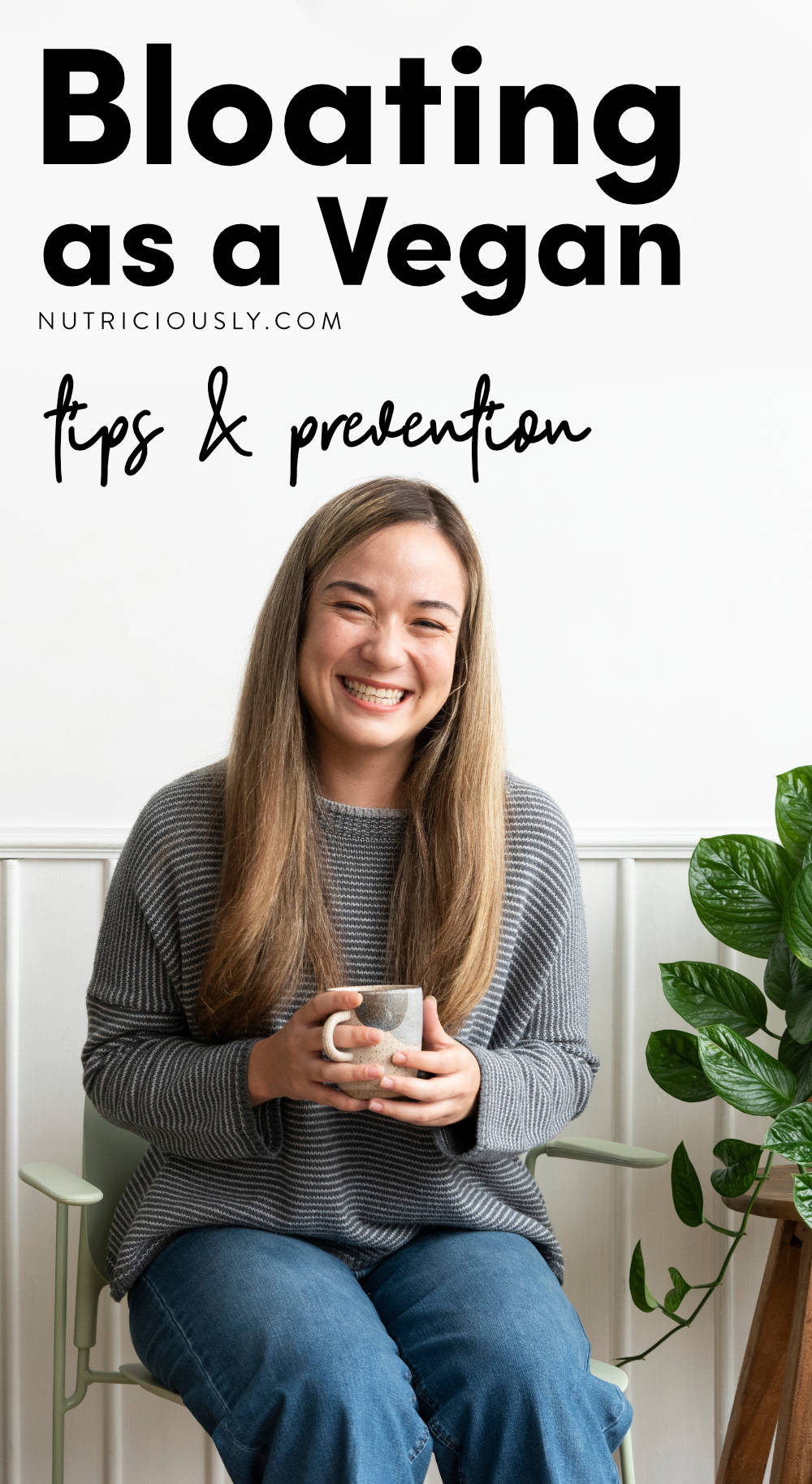
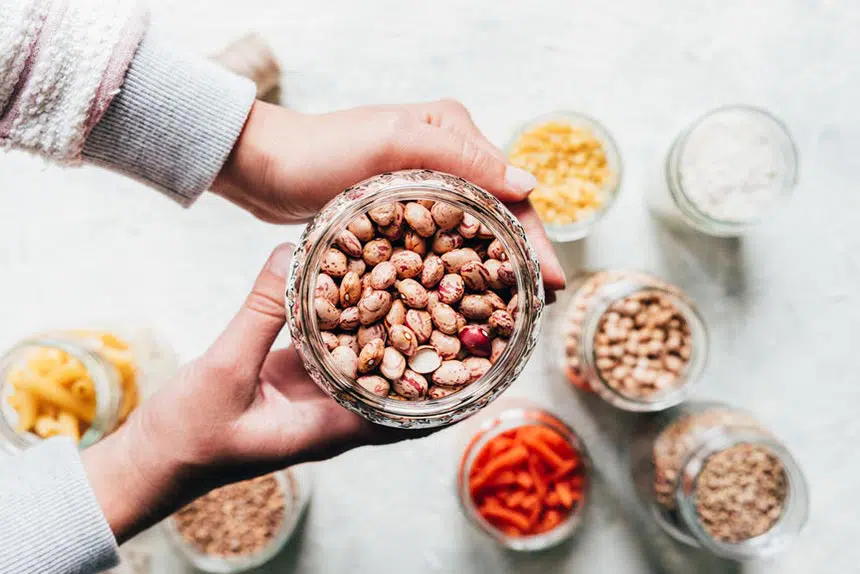
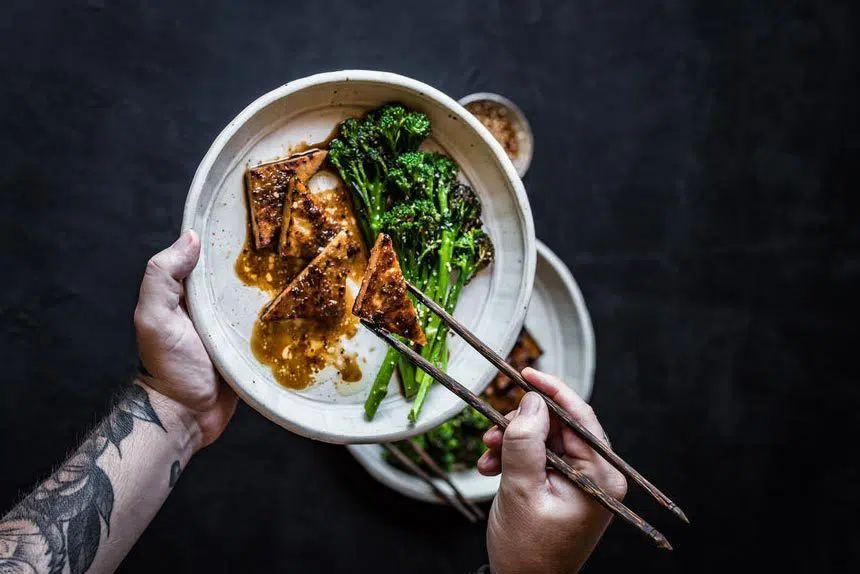
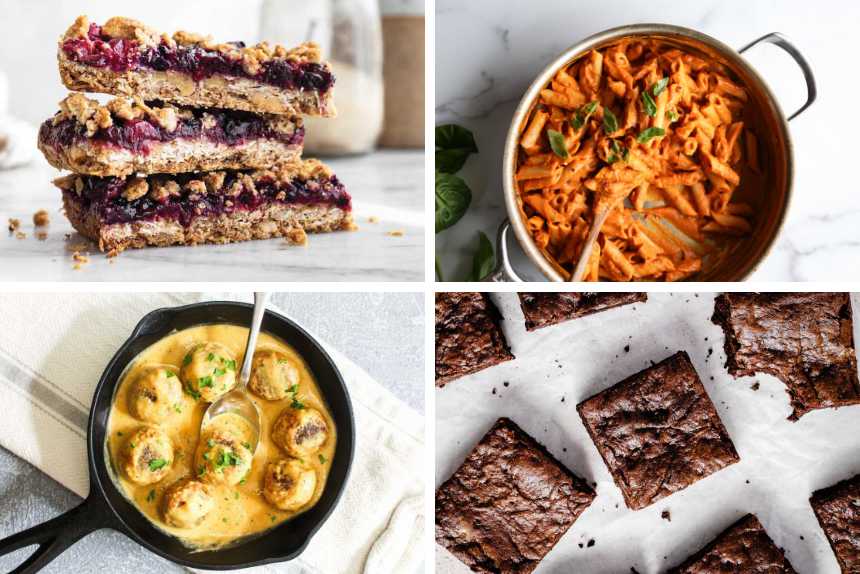

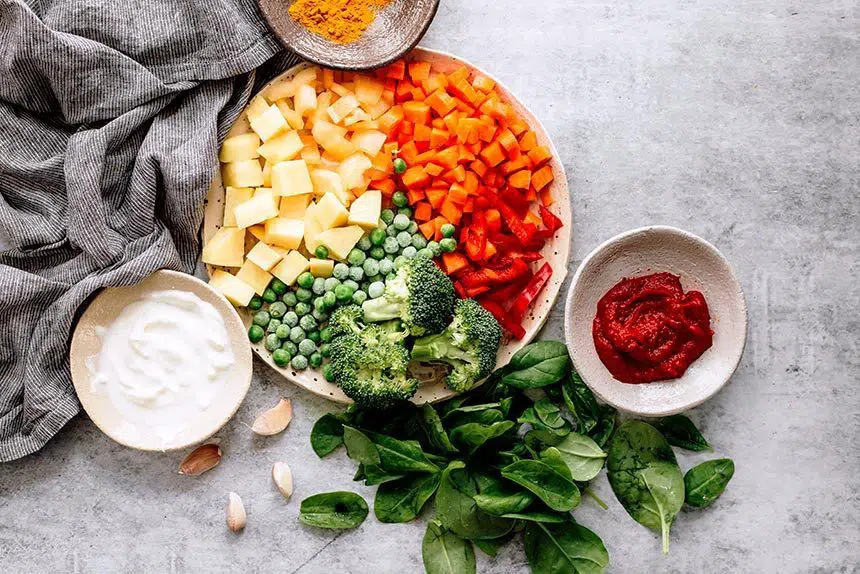
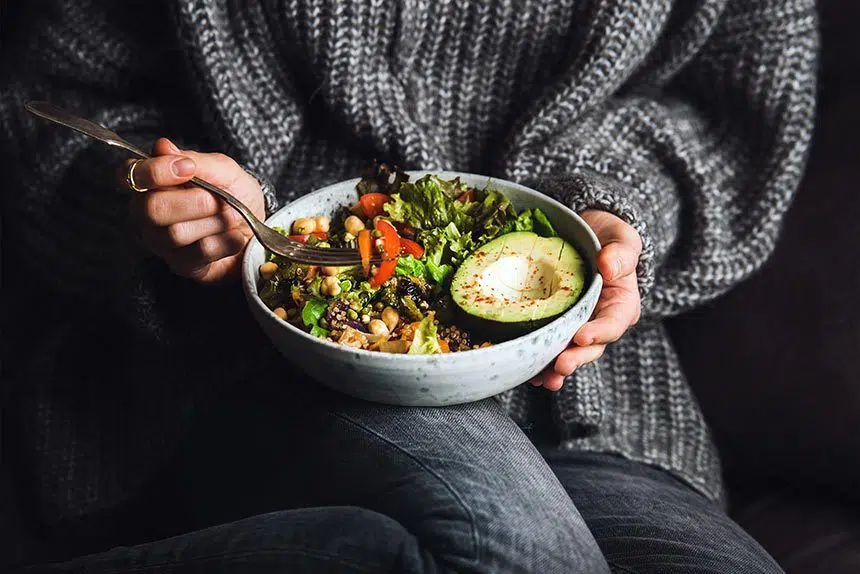
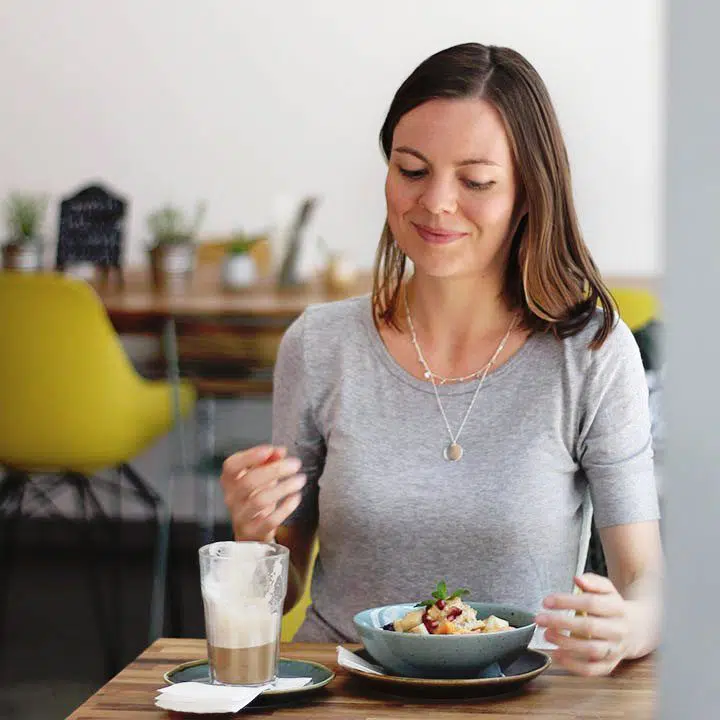
 Alena Schowalter is a Certified Vegan Nutritionist who has been a vegetarian since childhood and vegan since 2012. Together with her husband, she founded nutriciously in 2015 and has been guiding thousands of people through different transition stages towards a healthy plant-based diet. She’s received training in the fields of nutrition, music therapy and social work. Alena enjoys discussions around vegan ethics, walks through nature and creating new recipes.
Alena Schowalter is a Certified Vegan Nutritionist who has been a vegetarian since childhood and vegan since 2012. Together with her husband, she founded nutriciously in 2015 and has been guiding thousands of people through different transition stages towards a healthy plant-based diet. She’s received training in the fields of nutrition, music therapy and social work. Alena enjoys discussions around vegan ethics, walks through nature and creating new recipes.
Wow, what a great and well researched article!
Thank you for this awesome website <3
Love from Berlin
Johanna
Thanks so much, Johanna! Yes it took quite some time but it’s an important topic and I wanted to create a great resource. We’re so happy that you like our website! Feel free to share it around. We regularly come across yours as well <3
Have a happy sunday!
Alright, there’s some powerful gas remedies there for you to use that will work a treat. The best way to get rid of your flatulence, and keep it away, is to use a combination of remedies rather than just one or two. And definitely stay away from foods that are known to give you gas. Remember, our ozone layer depends on it!
Haha, true! The less air pollution, the better. I agree that using several techniques is very helpful and also of course avoiding triggers as much as possible!
Thanks for your comment, feel free to check out our other posts as well.
Have an awesome week!
Best,
Alena
I have tried supplementation right off the bat. It working.. then I learned that drinking lots of water works so well pushing everything through. Do you think that also intolerance could cause this? I find I am a little gluten intolerant and the min I cheat and eat bread.. I have gas and I get so bloated.
Hey Julia,
glad you have sound something that works for you. Water is always a good idea! As for intolerances, check tip 4 and tip 10 again :) If you want the free anti-bloat bundle, you’ll get a printable food journal template, 3 recipes for a flat belly, as well as an overview of possible trigger foods and what to choose instead.
Hope this helps!
Am so excited to click in wonderful blog for putting me through what I have being suffered for many years back. But I try the method of chewing before swoll. I did less but now I known it can reach up to 20 times . Thanks alot .
Thanks for the feedback and good luck with healing your digestions!
Need to re-name this article. Changing one’s diet is *not* fast, and too little too late when you’re doubled over in crippling gas pains and frantically searching for relief.
Hi Amy, there are a few tips like moving around, applying pressure or drinking water that can help immediately. And for your next meal, you can know which foods to avoid that are likely to bloat you even more. It’s always best to tackle the root cause and figure out the best way to eat so you don’t get bloated in the first place.
Hope this was helpful anyways!
Hummus tends to make me bloated and gassy. The overeating and eating to fast tip really resonates with me, I’m definitely guilty of that. Thank you for the reminder to slow down!
Hope it helps! Smaller portions were a game changer for me though I had to get used to the different feeling of satiety.
Thanks for the feedback, will keep that in mind! Our bodies can really react differently to these things.
Keep Writing! You have a gift mixed with a passion, and it shows! Thank You!
Will do, thanks so much for the feedback!
Hi, Thanks for such a detailed and informative article on a sensitive subject such as this.
My concern is that legumes and lentils are touted as “dangerous” foods by so many websites for they contain phytates and lectins that leach out our minerals.
I have them on and off but feed my dogs these good, nutritious foods everyday, after washing and thoroughly soaking them overnight. Apparently that is just not enough to get rid of the legume and lentil protectors that may cause irreversible damage to GI tract and even autoimmune disease.
Would highly appreciate if you can offer information on this as I am in a quandary, especially as my babies are involved.
They say fermentation is the best way to eat these legumes and lentils. Can you advise?
Thanks! :)
Hi Melina,
I totally understand that this is confusing. All this talk about “anti-nutrients”… turns out, these phytates are also protective for us (https://nutritionfacts.org/topics/phytates/)!
Please see these links for more:
https://nutritionfacts.org/video/increased-lifespan-from-beans/
https://www.ncbi.nlm.nih.gov/pubmed/15228991
Fermented foods are healthy for your gut, that’s true. You can try tempeh which is fermented soy beans. Dairy I wouldn’t suggest since it’s pretty harmful to our overall health but you can make your own kefir from water or plant-based milks!
Hope this helps :)
Best wishes,
Alena
Hiii, i’m Vitoria and loved your article! But I’m still a little bit cofused. I’ve been vegan for 3 weeks now and at the beginning it was awesome, but now I feel that I might be eating too much. I’m always filling full after meals even though I’m eating a lot of raw food. I don’t know if I should eat less or eat less fiber. Maybe my body is not ready yet for that amount of fiber. Do you have some advice ?
Hey Vitoria,
thanks for the feedback! Yes, plant-based foods have a lot more fiber which could become an issue if you overdo it in the beginning.
Feeling full after eating is what you should be aiming for, though it shouldn’t be uncomfortable. When you go for raw foods, they quickly fill you up while offering only a small amount of calories – if you don’t want your stomach to be this extended, reach for more calorically dense foods like whole grains. You can have a smaller amount of food for the same amount of energy, basically.
What exactly are your problems? Feel free to reach out via email for more support :)
Good things should share to all.
So helpful article for me.
Thank You!
Thanks for the lovely feedback! So happy this was helpful to you :)
Hi
I am 28 and I had 30 grams black sesame for 3 days approx 90 grams total and it took me 1 month to come in normal state. It gives me hypertension,
dizziness , high blood pressure.
Now i feel good. Your article is very helpful so thank you … really thank you. You have done a great job.
Sorry to hear about your struggles but I am glad to know that you’re all better now. Haven’t heard of this issue regarding sesame seeds before.
We’re happy that you enjoyed our article!
All our best x
Hello Alena! I rarely leave comments on blogs, but just wanted to tell you what an informative, insightful post this was – loved your input on your own experience as well – I recently had a pretty bad bout of acid reflux + bloating so I’m definitely going to put these to the test.
Thank you!
So happy to hear! Thanks so much for leaving this comment and good luck with your digestion :)
I accidentally opened your article about how to remedy bloating. Actually I have been experiencing the pain and discomfort for a week already! Your knowledge & advice is great!
hope you’re feeling better by now!
This is a terrible write up. Have tried many of this and Jo success. This write up is like many Google searches compiled in one place. A monetized blog.
sorry that none of this has helped you so far – time to check in with a health professional for sure!
It seems like you haven’t really gone through our blog if you think it’s of poor quality :)
Wow, I had no idea that there were so many factors that could lead to flatulence and bloating. I had always believed that it was just the kinds of food you ate. However, if you can still get it from stress and anxiety then maybe medication could help as well?
True, if dealing with severe mental issues, medication could probably work – but really not our field of expertise and we’re definitely not trained to say anything on it :)
Great article. Super helpful. Thank you! I have been looking for some help with my IBS and I am buying some herbal formulas https://www.bestchinesemedicines.com/collections/metabolism-thyroid this week. I am hoping that with some of the changes you guys are suggesting and the TCM that I can take I can have some relief and some healing. I recognize that there are food I really just can’t eat and that is okay. I really just want to heal and that means have more energy and sleep better and spend less time in the bathroom!!!!
glad you found it helpful – please feel better soon! Digestive trouble can really diminish your quality of life.
This is a very helpful article. I am suffering from stomach ache as well as a toothache at the moment. This is God send, thank you!!
Useful blog! This has proven a great help for me. Thanks a lot for such a useful tips. Thanks for advice it was worth reading it.
I had s colonoscopy 3 weeks ago! Since then I’ve been bloated, gassy, belching as just miserable! Dr told me it could have been the prep that did this. Maybe the good/ bad flora in stomach is messed up! Help!!
Well versed knowledge. Thanks for guidance. : ADV Manojj Biniwalle
Thank you for all the great information. I was Keto/paleo for 2 years. Now taking the best of both and moving forward to a plant based eating plan. Definitely have to adjust some things and re-introduce certain foods very slowly as the I am experiencing the gas/bloat issues. I’m excited to move forward but continue to do my “food homework” as the lessons change daily !! Wish me luck ????
This article was not only extraordinarily helpful, but also well written. Obviously, the article is written by someone with a thorough knowledge regarding gas relief and provides eating strategies for those individuals who need to make necessary positive lifestyle changes who have more significant problems. I will look forward to reading additional articles by this author.
Thanks for the great information is very helpful. My gallbladder was removed since then I have digestive problems. This article is really helpful
Well written, intelligent alternative method to healing oneself.
I like the way the information is presented, and that all of the dietary tactics(which are many!) are deemed interdependent upon one another.
Great job! I will use this as a ‘guide’ to eating properly.